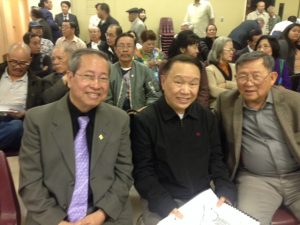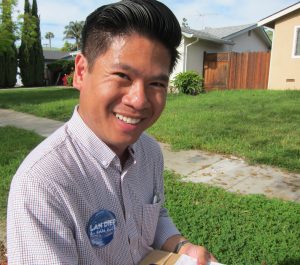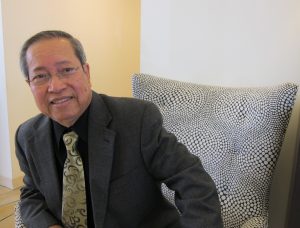Did President Obama seek to hearten the Vietnamese people or to make sales for U.S. companies
By Sharon Simonson
Pride and hope, disdain and despair fought for mindshare in Silicon Valley’s Vietnamese-American community this week as President Barack Obama visited the Southeast Asian nation and announced the end to a 50-year arms embargo.

The population’s youth and the legions of Vietnamese people who turned out for the president, some waiting for hours in the rain “to see a car pass by,” cheered Loc Van Vu, who founded San Jose’s Immigration Resettlement and Cultural Center in 1976. If the president is pivoting to Asia, the Vietnamese are pivoting back, he said: “It looked like the whole country is looking west to America, freedom and democracy.
“Let the Vietnamese have weapons to defend themselves. It is good for America and good for the Vietnamese.”
But others saw false optimism and lost opportunity, predicting little long-term change in the lives of most of the country’s 90 million people. They heard double meaning and hidden hard truth in the president’s words at the National Convention Center in Hanoi: “To all of the young people listening: Your destiny is in your hands,” the president said.
“The president’s visit is a very big deal,” said San Jose Councilman Tam Nguyen, but “I don’t think it accomplished anything special.” Obama pushed a favored trade agreement and helped two big U.S. companies gain lucrative contracts while paving a route for later sales by U.S. defense-equipment manufacturers. But that is all, he said: “I’m very mad, and I feel sad that’s how Obama is going to behave.”
![]() More than 135,000 Vietnamese people live in Santa Clara County; 88 percent were born in Vietnam. Three-quarters came to the United States before 2000, but 7,400 Vietnamese have come to Santa Clara County since 2010. Nearly 60,000 Vietnamese and Vietnamese-Americans live in the San Francisco-Oakland metro area.
More than 135,000 Vietnamese people live in Santa Clara County; 88 percent were born in Vietnam. Three-quarters came to the United States before 2000, but 7,400 Vietnamese have come to Santa Clara County since 2010. Nearly 60,000 Vietnamese and Vietnamese-Americans live in the San Francisco-Oakland metro area.
Many Vietnamese in America are refugees and former prisoners of war who revile the Vietnamese government and Communist Party. “Vietnam’s human rights record remains dire in all areas,” according to Human Rights Watch. More than 1.6 million Vietnamese people live in the United States.
The president’s visit included the signing of an $11.3 billion contract for U.S.-based Boeing to sell 100 airplanes to Vietnam’s VietJet, the largest commercial airplane purchase in Vietnamese aviation history. General Electric and the Vietnamese Ministry of Industry and Trade also signed a memorandum of understanding to build wind farms to bring electricity to 1.8 million Vietnamese homes over the next decade. President Obama and Vietnamese President Tran Dai Quang observed the signing of both contracts. GE Vietnam already employes 900 people.

The U.S. is Vietnam’s largest export market, buying 18 percent of its goods and services shared worldwide, according to the most current United Nations data. Exports to Japan and China, its next two largest markets, account for about 10 percent apiece. Tourism is the country’s largest service export.
Conversely, more than a quarter of the foreign goods that the Vietnamese buy are made in China, the greatest share. The United States ranks behind Korea and Japan in exports to the nation. The Vietnamese government currently buys 80 percent of its weaponry from Russia.
Thirty-two-year-old Lan Diep, the son of Vietnamese refugees and a candidate for San Jose City Council, refuses to buy Vietnamese goods in solidarity with the people of his family’s homeland. While he admires President Obama and worked on his 2012 campaign, he has no confidence in the Vietnamese government. “It is painful to see people live in Vietnam as they do,” he said.![]()
He worries that events like the president’s visit and incremental but tiny improvements in people’s lives act as a pressure release and undermine popular passion to provoke leadership change. “I worry that the government is turning Vietnam into a cog to prop up the economies of the first world and limiting its path to becoming a first-world country,” he said.

San Jose Vietnamese-American community activist and radio and television talk show host Lam Nguyen, who was born in Vietnam and came to the United States in 1975, scoffs at the contention that the Vietnamese government ever intends to confront the Chinese government militarily, U.S. weapons or no. Obama visit or not, he doesn’t believe the government will stop abusing it citizens. Fulbright University Vietnam, the first independent university in the country, will mostly enrich the lives of the children of Communist officials. The government’s release of the Catholic priest Nguyen Van Ly was tokenism of the worst sort.
“Vietnamese people inside the country have very high expectations for the outcome of President Obama’s visit and trip,” he said. “For me, I can make an analogy: It’s like drowning people who are desperate, they try to grasp at anything that can save their lives.” With the new American weapons, the Vietnamese government can sell its old ones to other, even poorer countries, he notes, plus have better tools to oppress its people.